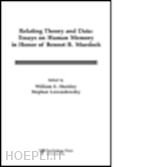Contents: Part I: Introduction. S. Lewandowsky, W.E. Hockley, Relating Theory and Data: Towards an Integration. Part II: Perspectives on Human Memory. M.C. Corballis, Memory, Growth, Evolution, and Laterality. D.L. Hintzman, Why Are Formal Models Useful in Psychology? L-G. Nilsson, J.M. Gardiner, Memory Theory and the Boundary Conditions of the Tulving-Wiseman Law. E.U. Weber, W.M. Goldstein, J.R. Busemeyer, Beyond Strategies: Implications of Memory Representation and Memory Processes for Models of Judgment and Decision Making. R.S. Lockhart, Varieties of Theoretical Perspectives. Part III: Processes in Immediate Memory. R.G. Crowder, I. Neath, The Microscope Metaphor in Human Memory. A.F. Healy, T.F. Cunningham, A.T. Gesi, R.G. Till, L.E. Bourne, Jr., Comparing Short-Term Recall of Item, Temporal, and Spatial Information in Children and Adults. W.K. Estes, On Types of Item Coding and Source of Recall in Short-Term Memory. A.D. Baddeley, C. Papagno, D. Norris, Phonological Memory and Serial Order: A Sandwich for TODAM. F.I.M. Craik, Peace Pipes Around the TODAM Pole: A Puff for Short-Term Memory. Part IV: Processes in Recognition. G. Mandler, Your Face Looks Familiar but I Can't Remember Your Name: A Review of Dual Process Theory. W.E. Hockley, Recognition Memory for Item and Associative Information: A Comparison of Forgetting Rates. B.A. Dosher, Bias and Discrimination in Cuing of Memory: A Weighted Decisions Model. R. Ratcliff, G. McKoon, Using ROC Data and Priming Results to Test Global Memory Models. N.J. Slamecka, The Analysis of Recognition. Part V: Componential Approaches to Memory. M.S. Humphreys, J.D. Bain, Episodic and Strength Components in Recognition Memory. R.M. Shiffrin, K. Murnane, Composition, Distribution, and Interference in Memory. G.D. Logan, Automaticity and Memory. W. Kintsch, D.M. Welsch, The Construction-Integration Model: A Framework for Studying Memory for Text. E. Tulving, Ben Murdock and Complexity of Memory. Part VI: Distributed Approaches to Memory. J. Metcalfe, Composite Memories. D.J.K. Mewhort, D. Popham, Serial Recall of Tachistoscopic Letter Strings. S. Lewandowsky, Gradual Unlearning and Catastrophic Interference: A Comparison of Distributed Architectures. J.A. Anderson, Why, Having So Many Neurons, Do We Have So Few Thoughts? R.P. Goebel, S. Lewandowsky, Retrieval Measures in Distributed Memory Models.











